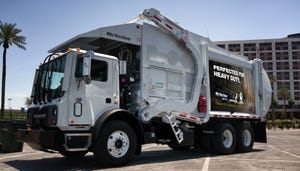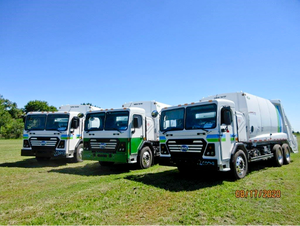How To Buy Recycled By The Book
January 1, 1997
Richard Keller
With U.S. Environmental Protection Agency's (EPA) "Buy Recycled" guidelines in place, buyers across the country are scoping out new purchasing methods (see chart, next page).
One tool that buyers may consider before getting started is a buy recycled training program developed by the Northeast Maryland Waste Disposal Authority (NMWDA), Bal-timore. The program teaches state and local government procurers as well as private businesses how to effectively purchase more recycled products.
A Buy Recycled Training Manual, which offers step-by-step instructions for setting up a buy recycled purchasing program, is used as the text for this hands-on seminar. With EPA funds, NMWDA provides the training and manuals on behalf of the United States Conference of Mayors' Municipal Waste Management Association's Buy Recycled Training Institute.
The National Association for Plastic Container Recovery also provides training funds and information on recycled products made from PET. Nationwide, nearly 4,000 buyers, recycling coordinators and using agencies, who prepare specifications for products and are the final product users, have been trained.
Early buy recycled efforts focused on enacting legislation and policies to buy recycled products. The emphasis now is on the implementation. The training program discusses a buy recycled program's key elements:
* Commitment. Agencies must make a commitment to buying recycled products. This is the first step in convincing manufacturers to invest in recycling equipment. It must begin with the organization's CEO and follow with the buyers, recycling coordinators and using agencies, an important, but often forgotten, part of the process.
* Variety of recycled products. To paraphrase the old orange juice commercial, recycled products are not just paper anymore. There are a wide variety of products for offices, vehicles, buildings and other uses made from paper, plastic, metals, oil, rubber and other materials. The training includes a discussion of the available products and sources of information, including recycled product directories and trade organizations.
* Price, quality and availability. Recycled products will be bought and used if they are priced competitively, meet the user's needs and are available. The training includes an explanation of recycled and virgin product prices (which are governed by demand, local markets and other conditions) and techniques to make the products more cost competitive, such as cooperative purchasing, life-cycle costing and increasing the number of vendors.
* Ask. Manufacturers and vendors will rarely offer recycled products unless the customer requests them. Therefore, it is imperative that users specifically request recycled products in bid documents.
* Specifications. Specifications must be written to eliminate barriers to using the products and providing incentives. Barriers to using recycled products can include obvious clauses such as "virgin only" and less obvious barriers, such as unreasonable delivery times, brightness specifications for paper and all-or-nothing clauses (where one bidder gets all of the business on a bid; this may eliminate recycled product manufacturers who do not make the wide variety of products).
* Testing. Recycled products must be tested to ensure high quality. It is important to test the product on your own equipment (to account for differences in climate, etc.) and to test blindly when possible (to eliminate bias against recycled products), so that if a recycled product fails, the assumption is because it was a poor quality product and not because it had recycled content. Good record keeping is important to convince users of the recycled product's quality based on the testing.
* Contractors and grantees. Use of recycled products should be included in contracts such as printing, janitorial services, building construction and road construction. Often, the dollar volume on these contracts far exceeds that of recycled commodities. Therefore, an opportunity to make great strides in using recycled products is lost if they are not used.
* Cooperative purchasing. By buying products cooperatively (both within the organization and in cooperation with other organizations), unit prices for recycled products will be reduced. The benefits of cooperative purchasing also include lower administrative costs, greater information sharing and an enhanced market influence.
* Closed loop recycling. Buy recycled programs should be coordinated with existing collection efforts so that, when possible, the organization is buying products manufactured from the recycled raw materials. Products such as toner cartridges and retread tires are usually purchased this way.
* Waste prevention. Organizations should not limit themselves to buying products with recycled content. They should also buy products that are recyclable, more durable, reusable and have less packaging and waste. Waste prevention is the most cost effective way to keep material out of the landfill and can often save far more money than any incremental cost increases for recycled products.
* Record keeping and evaluation. Agencies should keep good records on their recycled product purchases to provide reports to bosses and customers, to share successes and to provide baseline data to evaluate the buy recycled program and determine ways to improve it.
Without buyers willing to use recycled products, recycling programs will not have markets and will be doomed to failure. The buy recycled training program helps to develop sound implementation programs, to get using agencies involved and to increase buyers' and users' comfort with specific recycled products.
Many public and private agencies have buy recycled policies, but now we have to get down to where the rubber meets the road and establish programs to buy and use recycled products.
For a copy of the manual or more information, contact: Richard Keller, Northeast Maryland Waste Disposal Authority, 25 South Charles Street, Ste. 2105, Baltimore, Md. 21201. (410) 333-2730. Or, contact: Richard Kochan, United States Conference of Mayors, The Buy Recycled Training Institute, 1620 Eye Street, N.W., Washington, D.C. 20006. (202) 293-7330.
SWANA Collection Symposium The Solid Waste Association of North America (SWANA) will hold its First Annual Collection Symposium, co-sponsored by World Wastes, February 23-28 at the Sheraton Crown Hotel, Houston.
The symposium is geared to provide practical information for developing efficient collection strategies, increasing productivity and developing a motivated workforce.
Sessions include routing systems, preventative fleet maintenance, safety issues, and equipment/container innovations.
For more information, contact: SWANA, Attn: Registration, P.O. Box 7219, Silver Spring, MD. 20907-7219. (301) 585-2989. Fax: (301) 589-7068.
You May Also Like


